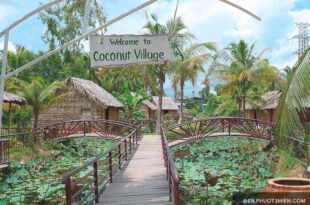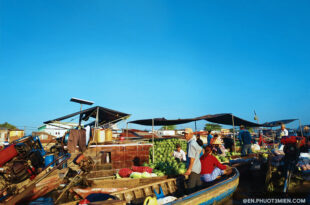The Most Delicious Fruits of Vietnam
Vietnam is not only famous for its delicious cuisine, but it’s also resplendent with tropical fruits galore. Let’s take a look at our most interesting fruits that you may have never seen before!
Tropical fruit lovers often say that they never want to leave Vietnam. Besides the beautiful sights, friendly people and amazing cuisine, fruit is also one of the factors that attract travelers time and time again. From the exotic fruit like durian to something tasty such as lychee, you will be able to find it all when traveling around the country. These are some fruits that are worth a try.
Durian – Sau rieng
Durians are referred to as “The king of fruit,” probably because of their fierce look and the aroma that, according to many Westerners, is the most terrible smell in the world. Durian has a tough, thorny crust and the fruit sellers usually have to wear gloves when opening them. Otherwise, they can stab their hands and make them bleed. A ripe durian usually weighs between one to two kilograms.
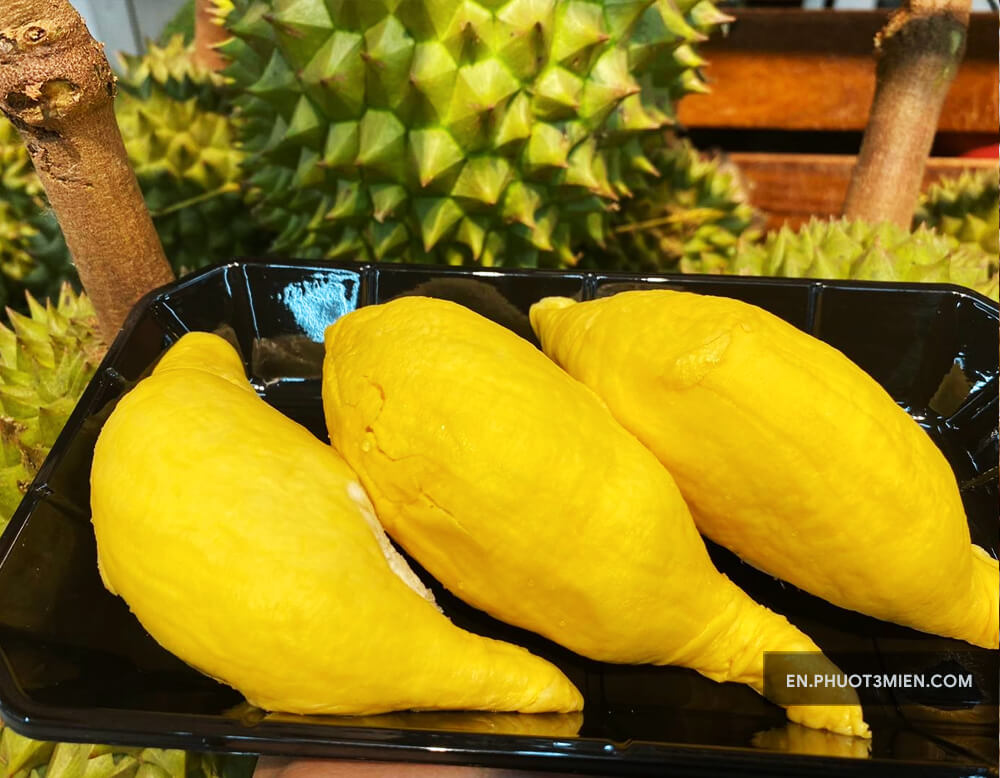
A durian consists of several segments separated into different compartments. The fruit’s large seeds are encased by the edible, eye-catching, bright yellow flesh. You have to use a large knife or scissors to open a durian. You’ll never know how many huge pieces of durian meat you’ll find under that thorny shell until you continue to cut it into smaller parts and look for yourself.
Durian has a very unique and characteristic scent. There are some Vietnamese and Asian people who cannot bear the odor, so it’s no wonder Westerners think that the smell is terrible. In some countries, it’s forbidden to carry durian on public transport or take them into a hotel. Nevertheless, if you are a fruit-aholic, you will enjoy this unusual fruit a lot because nothing compares to its incredible, creamy, sweet flavor.
Durian is also sometimes banned in underground subways because some people can not bear the smell!
Benefit: Each kind of fruit has different health boosting properties and durian is no exception. Here are some of the benefits you can get from “The King.” The fruit can lower blood pressure, have anti-aging components, rectify sexual dysfunction, and can improve cardiovascular and bone health.
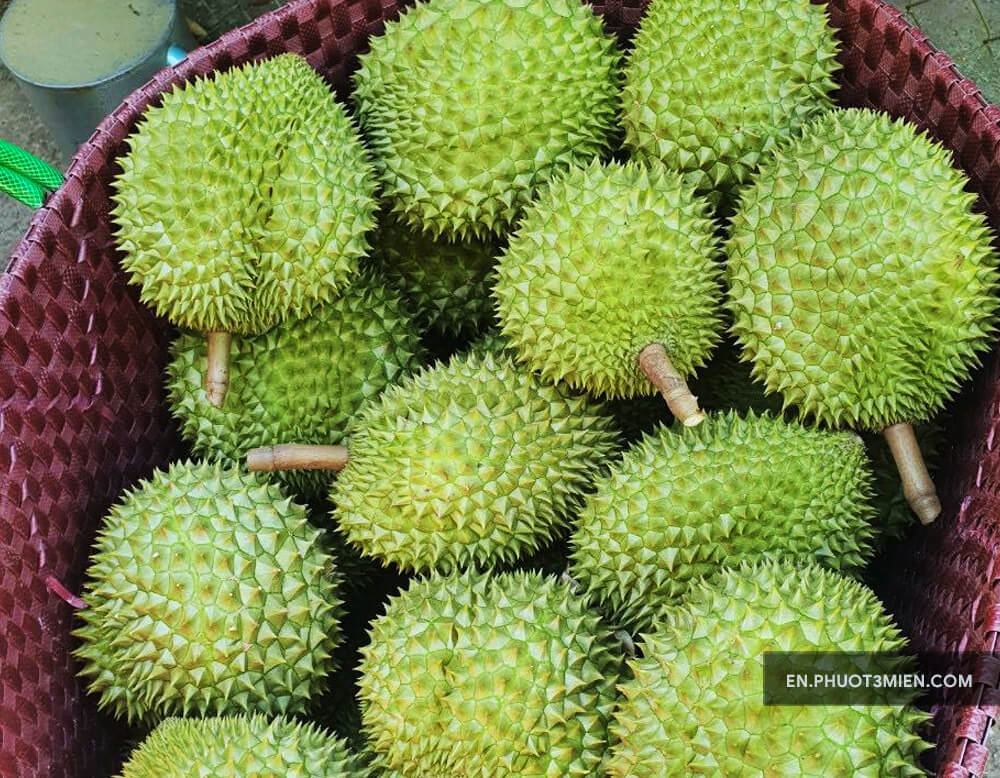
The only real danger in eating durians is the fat content. It has about three times more fat than most other fruits, with the exception of avocado. They are healthy fats, but for those people battling weight gain and obesity, other sources should be sought.
Where to Find Sau rieng?
With over more than 60 kinds of sau rieng from different regions in Vietnam, the king of all is sau rieng Cai Mon from Ben Tre province. If you dare to give this fruit a try, either travel to the Mekong Delta or find it together with normal durian in any market all over the country. The price varies, starting from 40,000 VND up to 100,000 VND and above per kilogram.
Fun Facts:
- In ancient times, Vietnamese parents would frighten their naughty children by asking them to knee on durian peel. Sometimes it was more than a threat, and the kids actually had to do it.
- Durian is also sometimes banned in underground subways because some people can not bear the smell!
Custard Apple (Na or Mang cau)
Custard apple, called Na or Mang cau by the Southern people, is one of the most unique fruits in the country. It doesn’t just stop with its delicate texture and authentically sweet flavor, but it also greatly benefits your health. You can easily find this fruit mostly everywhere, but you will find different types of this apple across Vietnam. There are two types of custard apple in Vietnam, na dai and na bo. Most people prefer na dai because it tastes sweeter and has fewer seeds.
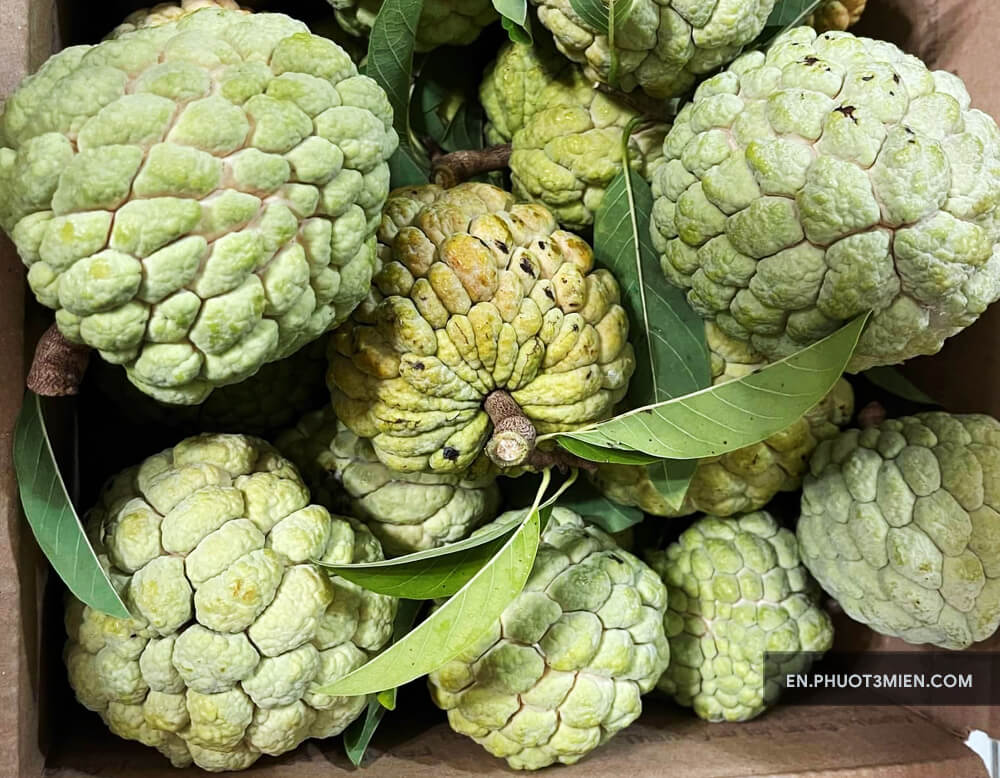
When July arrives, you know it’s time to hunt down the best custard apples! You can recognize them by their brown stalk, round shape, green color, and unique shell that may remind you of the back of a turtle. The riper they become, the more their shells expands, and this particular action is called opening eyes. Moreover, you can easily spot the ripe fruit by its gentle and fragrant aroma that will permeate a garden, and when you peel the outer skin off, what you get will be the sweetest fruit you have ever had the pleasure of trying!
Where to Get it?
Lang Son province is considered to be the best area to plant this fruit. You can also find this fruit in the Mekong Delta regions, but don’t worry because the vendors will transfer them to markets in big cities. The price varies but it mostly starts at 35,000 VND (2 USD) per kilo.
KKday is a travel APP platform offering over 20,000+ online products such as: tickets for amusement parks, outdoor services, sightseeing tours, culinary experiences, transportation, accommodation, courses, and local culture... Currently, there is a summer promotion with discounts up to 50% and coupons up to 250K VND off.

Attractive discount codes such as: 100K VND off for new accounts, 150K VND off summer promotion, 250K VND off, KKday birthday celebration...
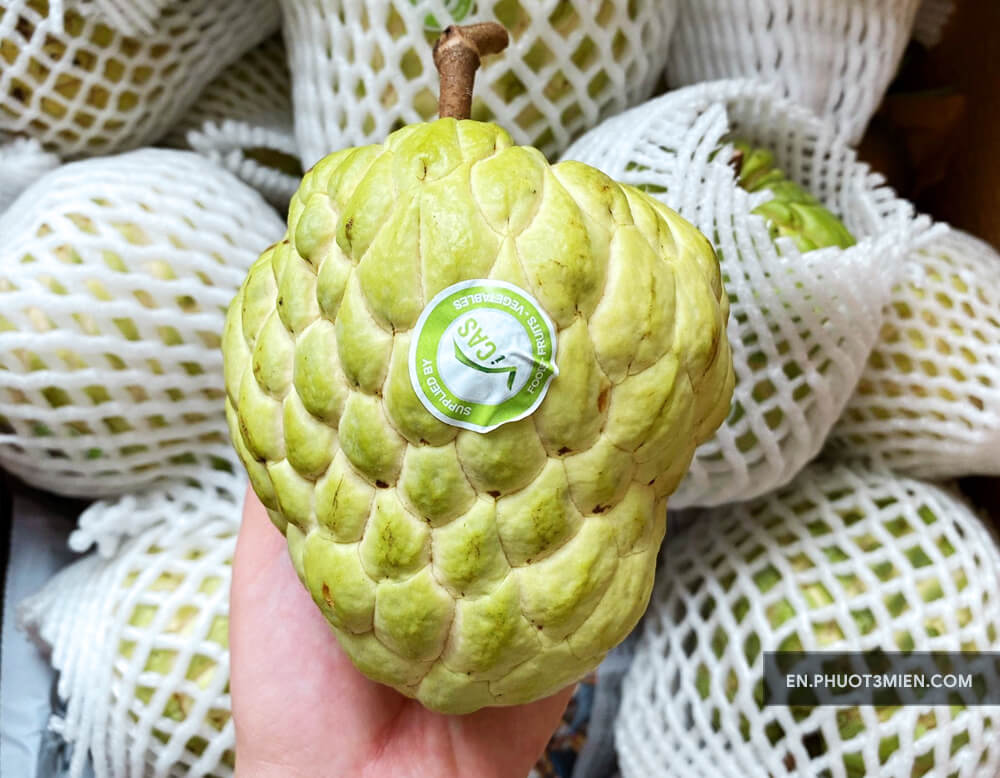
Fun Fact:
- In Lang Son, there is a kind of custard apple that weighs up to one kilogram per fruit! Isn’t it unbelievable?
Star Apple or Milk fruit (Vu sua)
If you love fruit that has a sweet taste, try star apple or milk fruit, especially when you travel to the Mekong Delta of Vietnam. Because the flesh of this fruit has a milky flavor, people call it milk fruit in Vietnam.
From the outside, the round shape of the fruit has a green or purple thick skin. Before eating, you will massage the fruit in your hand and gently squeeze it until it cracks. Then, cut it in half and eat the milky flesh by using a spoon or tearing it into pieces. Notice that the second way will make your mouth and hands very sticky since star apple skin contains a lot of latex. A great way to use this fruit is to blend it into a smoothie.
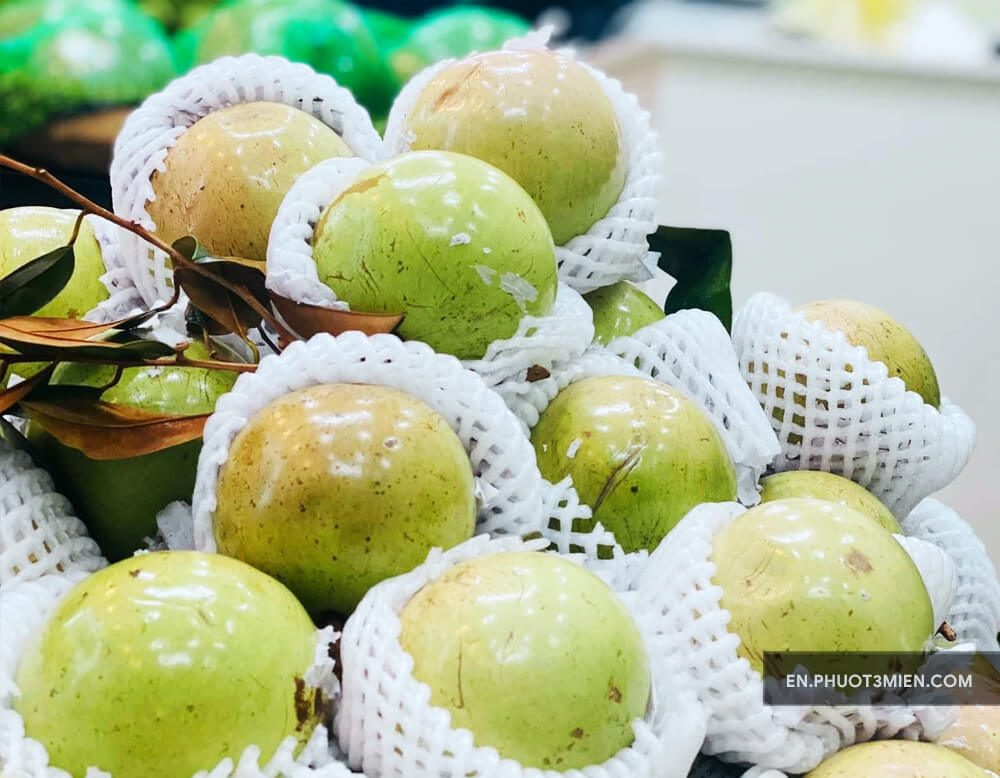
Not only does it taste good, star apple also contains a lot of nutrition like dietary fiber, vitamins, minerals, acid amin, and more. It helps prevent many health problems, even colon cancer.
Where to Get it?
The most popular star apple in Vietnam is vu sua lo ren Vinh Kim in Tien Giang Province. You can easily find it in any market, mainly during summer. You will pay around 26,000 VND (1.5 USD) for a kilogram.
Fun Fact:
- In 2017, Vietnam officially became the first country in the world to export vu sua to other countries.
Longan (Long nhan)
Longan is a popular tropical fruit, which is usually harvested in July and August. It’s loved by many people in Asia. The name long nhan has an interesting meaning, which is dragon eye because when you peel off the skin, the round black seeds and white flesh look like small eyes. However, don’t let the weird appearance fool you as when you give it a try, the unique aroma, pulpy texture, and sweet taste will spread in your mouth. Once you start eating, it’s hard to stop.
There are many ways to eat longan, such as longan sweet soup and lotus seed (a popular dessert in Hue), longan ice-cream topped with peanut is my most favorite flavor that can be found at Kem Nhan Chu Tam (Number 2, Truong Han Sieu, Da Kao Ward, District 1 HCMC), and herbal juice with longan is a great summer drink to try when in Vietnam.
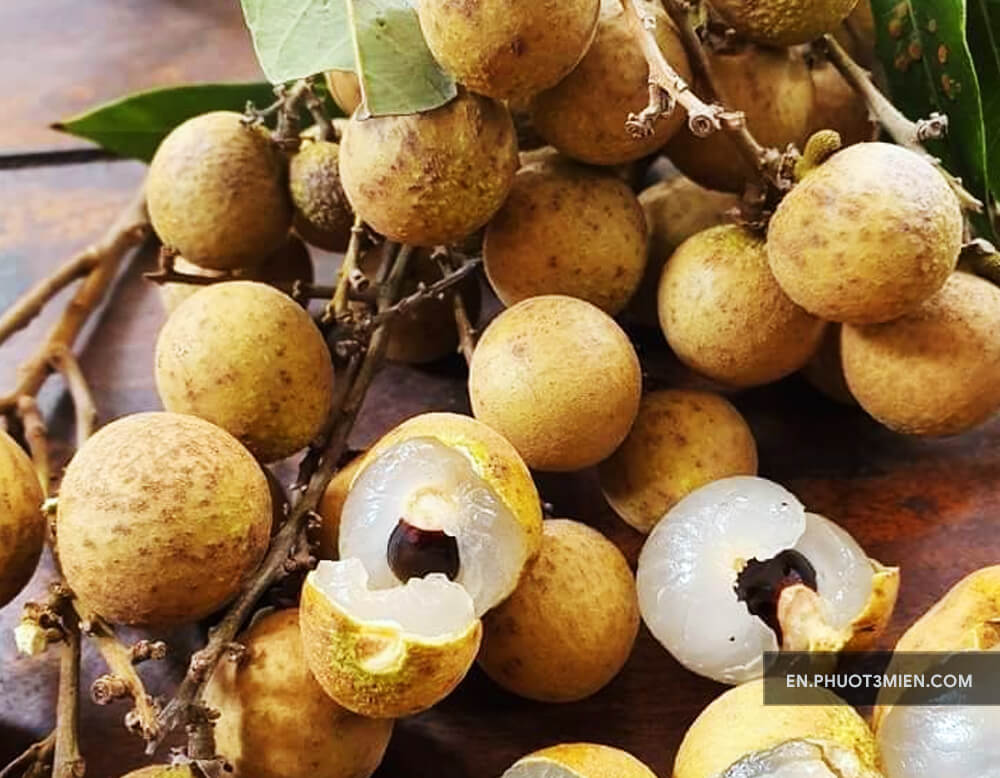
When it comes to health benefits, this fruit can either boost your health or cause some bad sides effects if you eat too much of it.
A few helpful vitamins and vital minerals can be found in longan such as vitamin C, Cu, Fe, and Riboflavin. This can help your immune system, strengthen your bones, and it’s also a source of iron. According to Eastern medicine, there are some bad effects too such as acne and high blood pressure (because it has a great amount of sugar). If you are pregnant, you should just consume a very small amount of longan.
Where to Get it?
Hung Yen, Hue, Vung Tau, Vinh Long, Tien Giang, and Can Tho are some provinces and cities that are famous for having the best longan in Vietnam. You can also find it in any market. Depending on the type of nhan, the price fluctuates between 30,000 – 70,000 VND per kilogram.
Fun Fact:
- Vietnam just successfully imported fresh longan to Malaysia in 2016
Lychee (vai thieu)
Originally from the south of China, this unique juicy fruit is favorited by many Asians when summer begins. May of the Lunar calendar is lychee season. The hard red rind that is often spiky usually scares people off. But once you give it a go and peel off the rough skin, you will be surprised by its flowery scent and sweet flesh. Then you can enjoy the white meat as you eat around the seeds.
There are a lot of ways to make use of lychee like lychee and jelly sweet soup, chicken cooked with lychee, duck salad with lychee sauce and more. But I personally like lychee tea and lychee cocktails. So folks, if you go to a pub and see a cocktail with lychee in the recipe, don’t think, just order it and you won’t be disappointed. Nevertheless, don’t eat too much of it otherwise it will cause some bad side effects like acne breakouts.
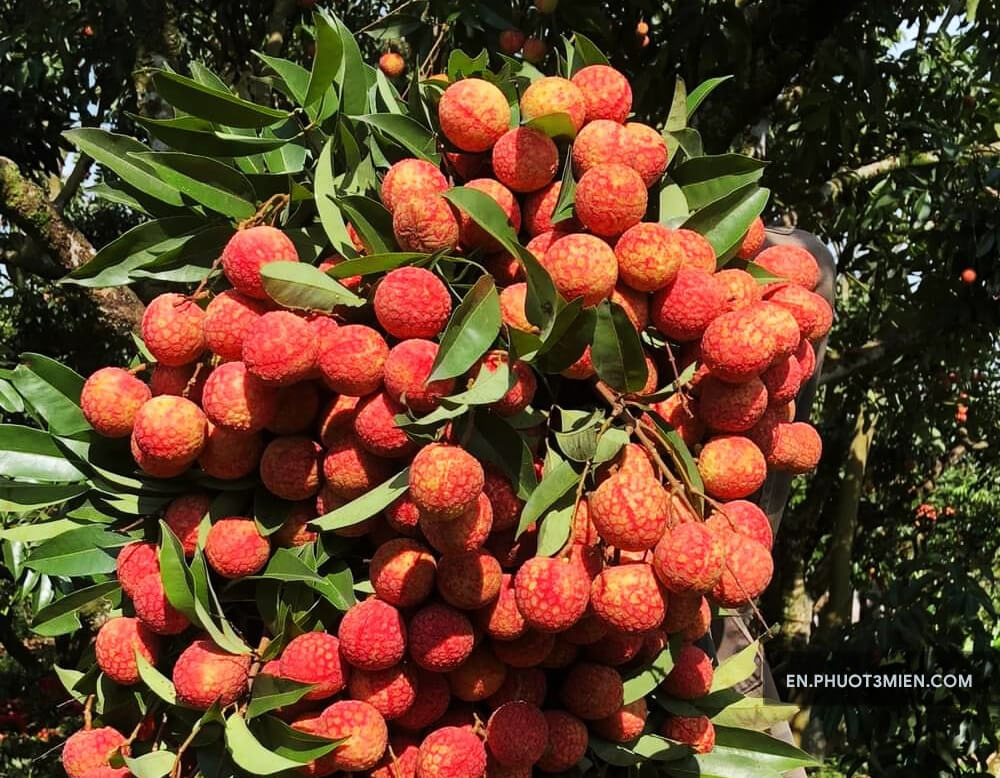
Like many other fruits, lychee is also comprised of many vital nutrients that help prevent heart disease, increase digestion, and it’s even a natural painkiller. Did you know that you can use lychee in your skin care treatment? For example, a lychee facial mask brightens your skin or lychee juice can strengthen your hair and more.
Where to Find lychee?
In Vietnam, the most delicious lychee can be found in Bac Giang (vai thieu Luc Ngan) and Hai Duong (vai thieu Thanh Ha). Don’t worry, you don’t have to travel up north to taste it as you can still find lychee in every part of Vietnam. The price for a kilogram shifts from 25,000 – 70,000 VND, depending on the region and type of lychee.
Fun Facts:
- In the past, lychee was a precious fruit, which was reserved for royal members.
- In 111 BC, Vietnam was ruled by the Chinese and people were forced to grant a lot of treasures to the Chinese king like gold, silver, pearls, elephant ivory, and lychee.
- Lychee was the favorite fruit of Yang Guifei, the favorite consort of King Zhou. She loved it so much that she even named it “the smile of imperial consort”.
Jackfruit – Mit
Jackfruit is the biggest fruit in the world. It has lumpy green peel and comes in many different sizes. Typically a ripe jackfruit weighs from 2 to 3 kg. Farmers commonly use their finger to press around a jackfruit to figure out if it’s soft enough to harvest.
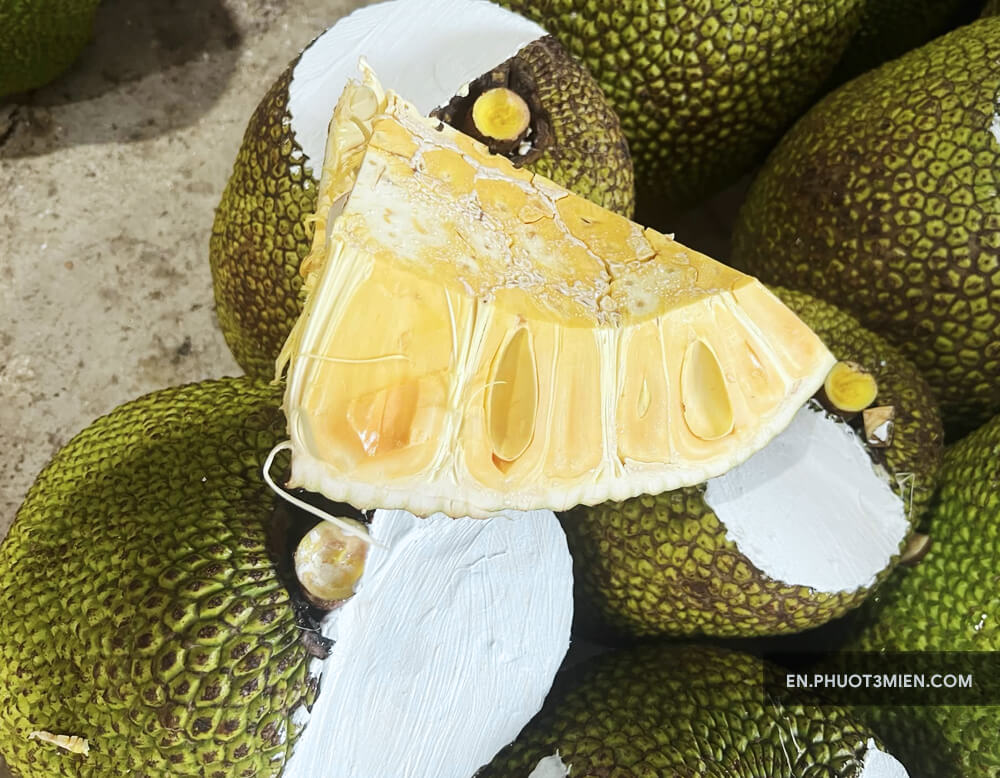
Jackfruit is bright yellow inside. The pieces of fruit are braided together by thin threads, and each one contains a seed of around two centimeters in diameter.
To eat it, you will first cut the jackfruit horizontally into two halves, then continue to slice each piece vertically. Use your hands to separate each segment from the jackfruit, then remove the seed and slowly enjoy the succulent flesh. Check out this video to understand more about how to handle this beautiful fruit. (Link youtube – sonny). Jackfruit has a powerful scent which you can smell from miles away and a memorable taste and texture – a little bit crunchy, slightly chewy, and as sweet as candy. Jackfruit stuffed with sticky rice and coconut milk is a dish that I love. You can find it at Xoi Mit Si Gon, 187 Co Giang, Co Giang Ward, District 1, HCMC.
It’s hard to believe that jackfruit has many health benefits. This fruit contains a massive amount of vitamin C as well as nutrients that help prevent cancer and aging of internal organs. It also helps protect your digestive tract, your eyes, your bones, and your skin. This is what I call a superfruit!
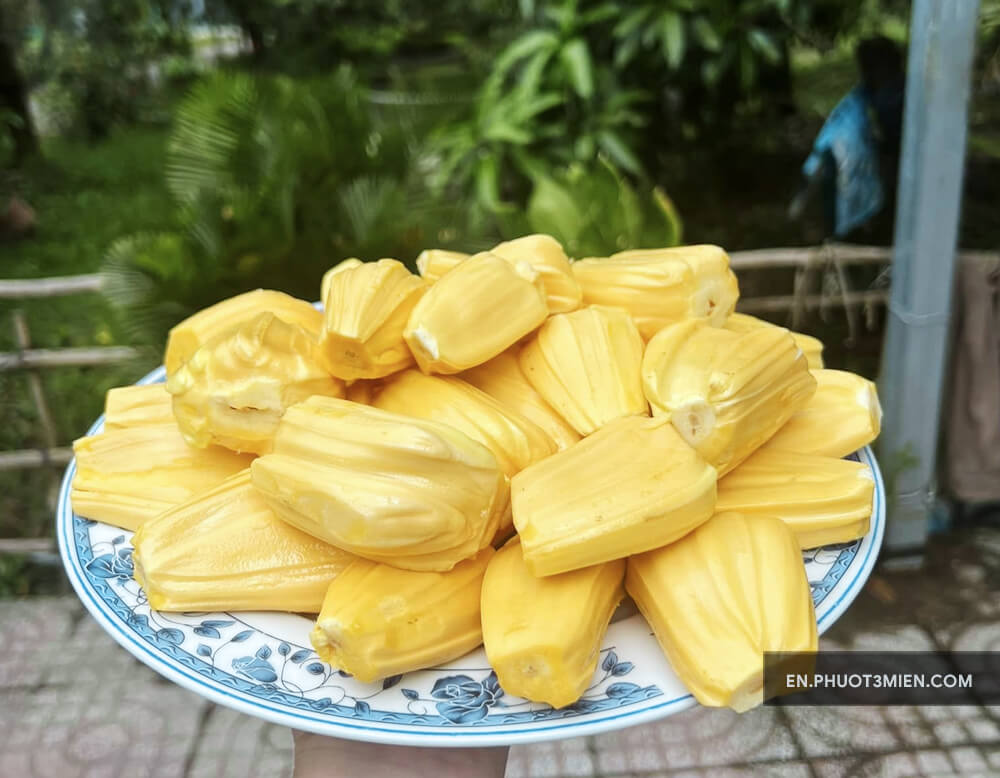
Where to Find Jackfruit?
In Vietnam, the most famous jackfruit is called mit to nu. Although its shape is smaller than other types of jackfruit in Vietnam and Thailand, it tastes sweeter and smells better. If you travel to Long Khanh area in Dong Nai Province, don’t forget to hunt for this fruit as this is mit to nu’s hometown. This fruit is also sold in most markets around Vietnam. The price for a kilogram of mit to nu is around 30,000 – 35,000 VND.
Fun Facts:
- Jackfruit is the national fruit of Bangladesh.
- Apply oil to your knife before cutting jackfruit because it’s super sticky.
- Don’t throw away the seeds, as you can make them into a yummy, creamy dish if you boil them for ten minutes.
Dragon fruit (a.k.a pitaya) – Thanh long
Dragonfruit has a dark pink shell with short green tentacles growing from fruit’s body. The fruits range in diameter from 7 to 10cm. Do you know why they are called dragon fruit? It’s because they look like a dragon head. It’s an interesting name, right?
Dragon fruit is white inside with many tiny black seeds.
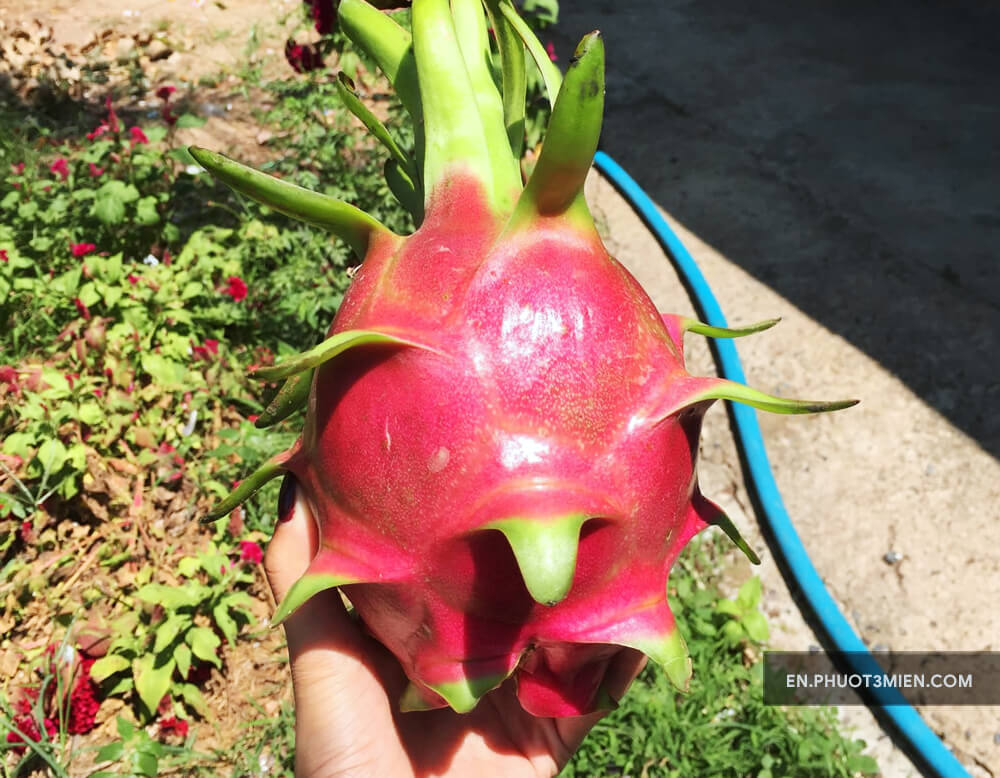
Dragon fruit traditionally has a white inside with many tiny black seeds. To enjoy dragon fruit, you need to cut the fruit vertically into two halves. Continue to cut the two pieces to get eight smaller portions which you can comfortably hold in your hand. Gradually remove the peel as you eat each piece or just remove it all at once and enjoy. It tastes succulent, with a slightly sour note, but a little sweet at the same time.
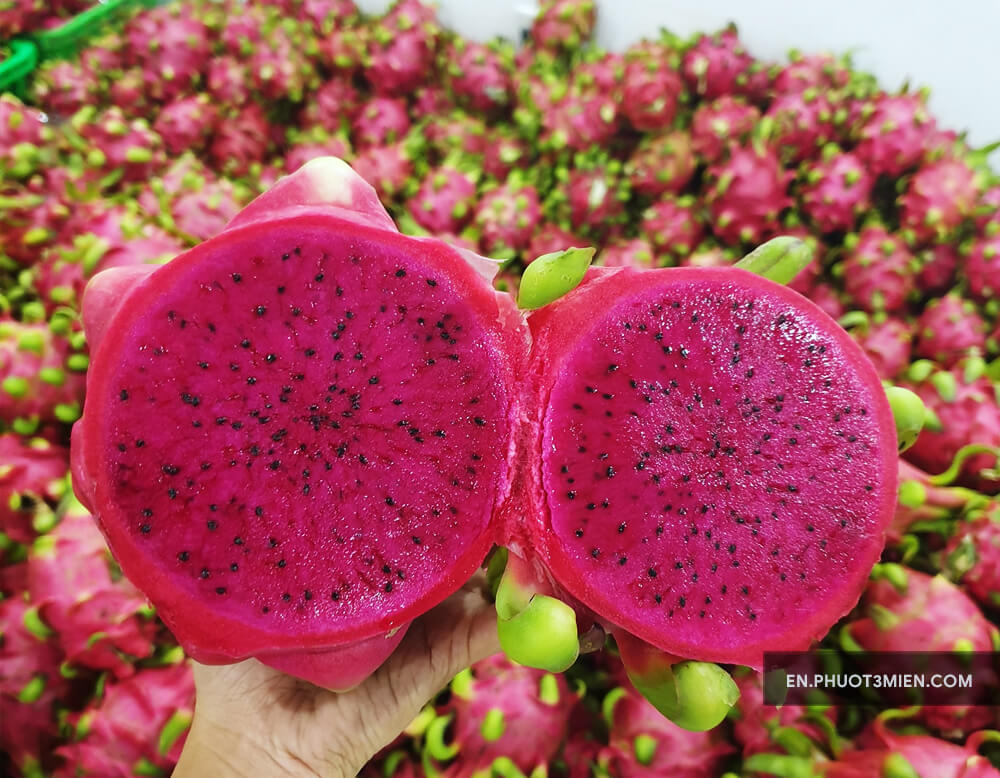
These fun-looking fruits contain around 60 calories each, are rich in vitamin C, B1, B2, and B3, and contain minerals such as iron, calcium, and phosphorus. All those nutrients are the reason dragonfruit can protect you from heart problems, aging skin, and acne. And it’s also super good for your digestion. Wow! Some people believe that it’s even better than cheerios. But much cheaper.
Where to Find Dragon fruit?
Binh Thuan province is said to be the dragon fruit kingdom because it has the best climate for this fruit to grow. When my parents took me to Mui Ne beach when I was a kid, I looked forward to driving past the bright farms of dragon fruit. Because we normally traveled there at night, I would often see these fruits illuminated by small lights, making it look like a galaxy of stars. A kilogram of dragon fruit with white flesh costs around 25,000 VND, and it’s a little more for red flesh, about 40,000 VND.
Fun Facts:
- You have to spit out every single seed when eating dragon fruit! No, just kidding. They’re completely safe so just enjoy them slowly, the same way you would any other “no-seed” fruit.
- The flesh of dragon fruit comes in two colors: red and white. Both types taste quite similar, however, the red flesh is said to contain double the amount of vital nutrients and vitamins as the white fleshed fruit.
Mangosteen – Mang cut
Mangosteens have a perfectly round shape. They are dark purple with a diameter of around 4-5cm, and their green stem looks just like blooming flower petals. The purple peel is quite hard.
The flawless milky white meat fits snugly into the outside peel and is divided into 4 or 5 pieces. The mangosteen’s appearance inside will blow your mind. You can smell the mild aroma of mangosteen as you bring it close to your nose. The texture is a bit soft and chewy. As soon as you take your first bite, the sweetness will overwhelm your mouth. A slightly sour flavor remains on the tip of the tongue even after you swallow it.
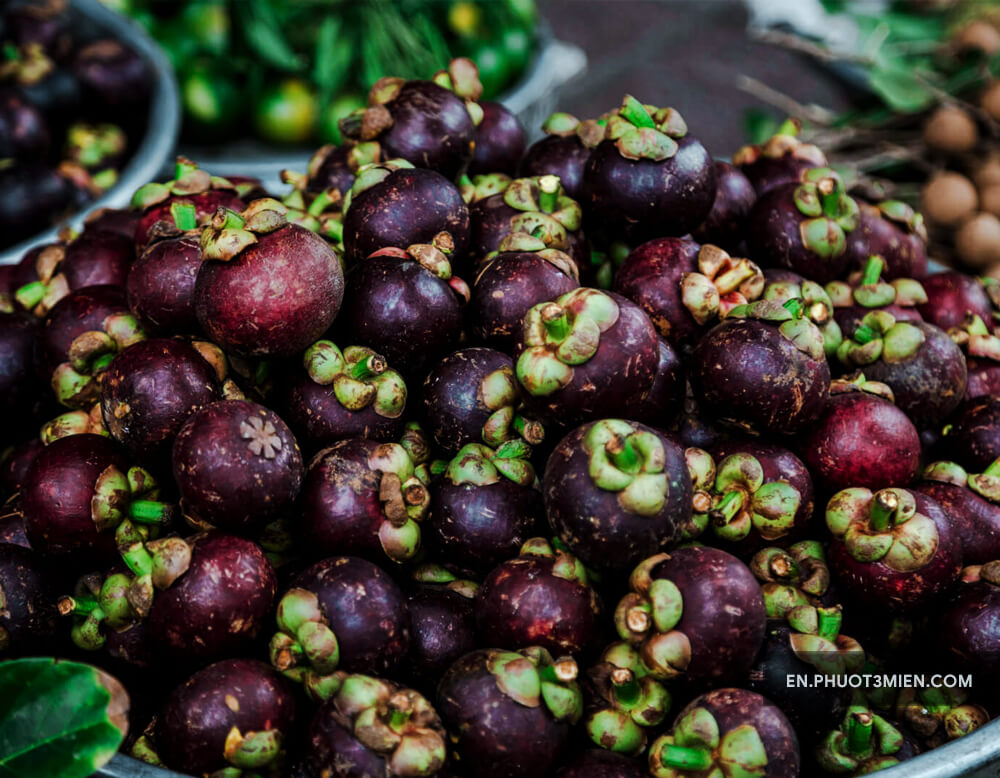
To get rid of the skin, you can hold the mangosteen between your palms and squeeze your hands together to crush open the purple shell, or use a knife to slice it open if you prefer.
Mangosteen contains special nutrients that can purify your body and relieve stress, which is the reason mangosteens are also known as the ‘nemesis’ of durian – a fruit that can produce a lot of heat in your body. In Thailand, people call durians and mangosteens ‘spouses.’ If you eat too much durian and your body gets hot inside, mangosteens will help reduce the heat immediately. Mangosteens also help prevent cancer, have anti-aging properties, and increase immunity.
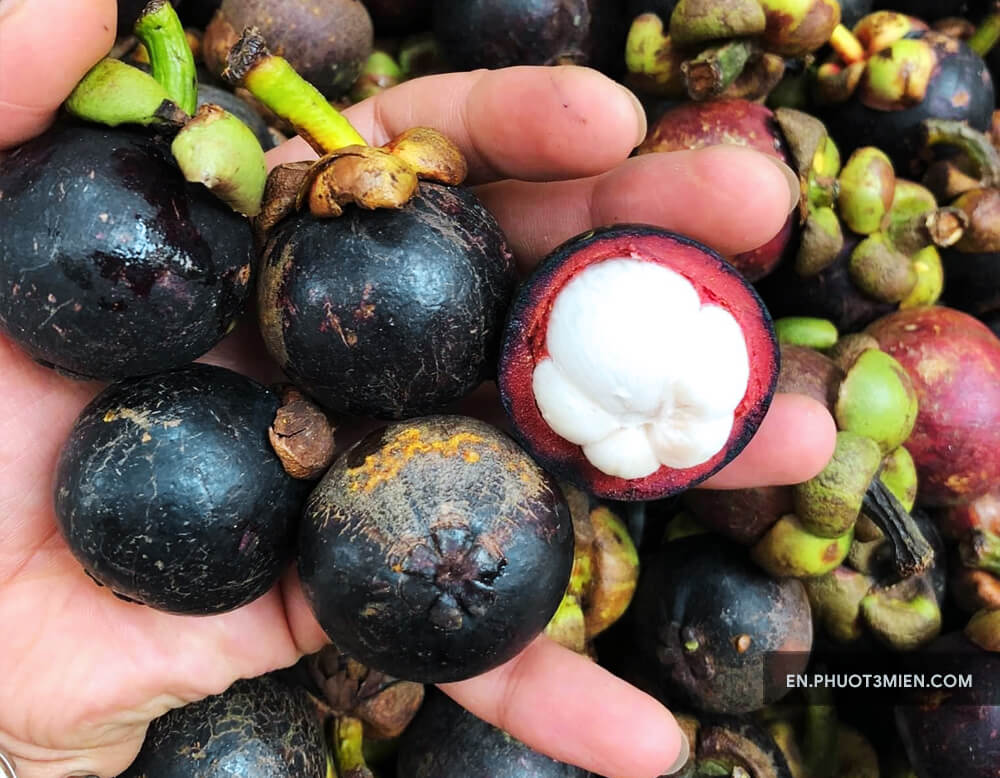
Where to Find mang cut?
This fruit is a real tropical resident, and it loves the heat. The best place to find mang cut in Vietnam is in the Mekong Delta. The price for a kilogram of mangosteen starts from 60,000 VND – 70,000 VND.
Fun Facts:
- A mangosteen tree can live up to 90 years.
- It’s one of the most expensive fruits in the world.
- Mangosteens contain high levels of sugar, so they are not recommended for people who are overweight.
Rambutan – Chom chom
Rambutan has a pretty odd appearance, with bright red or half yellow, half red color. It’s round like a chicken egg but has lots of green “feathers” around the outside.
Rambutans are translucent inside, with a fruity taste and crunchy texture. Some rambutans are slightly sour as well. Believe me; the sweet and sour taste is so harmonious, you will never forget what your mouth feels like after eating this popular tropical fruit. You need to peel it before eating, of course! The skin is easy to peel off, either with your fingers or with a knife. Just be careful not to swallow the pit as it’s not edible.
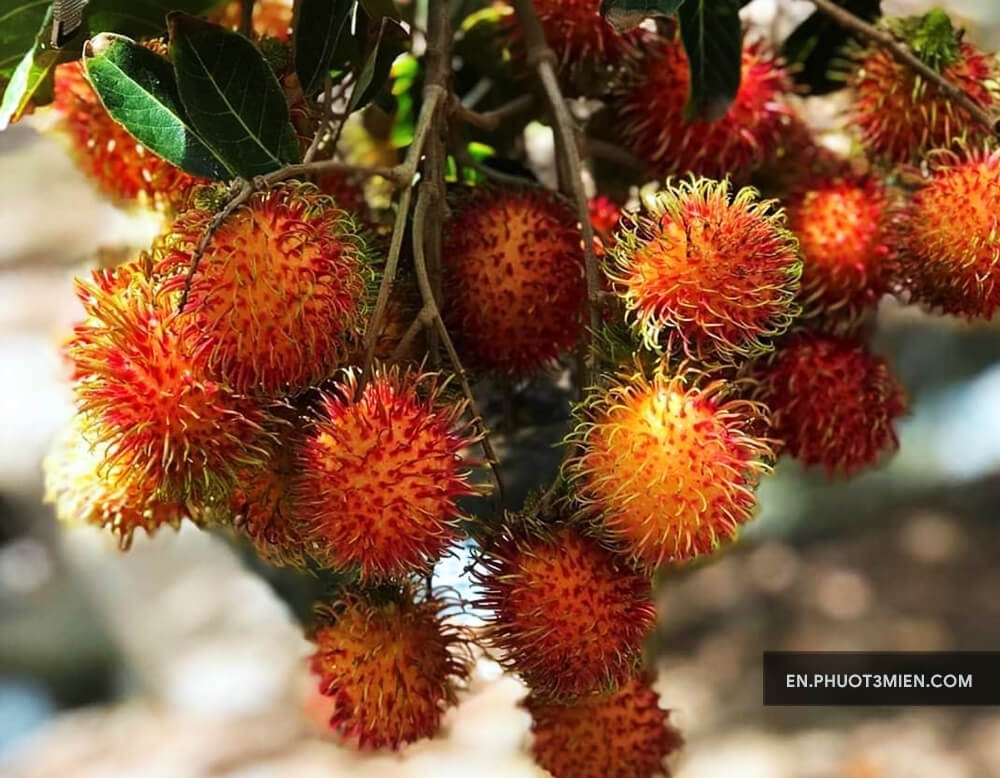
Like many of the other tropical fruits we’ve mentioned today, rambutans also provide us with a multitude of health benefits such as skin care, hair care, cancer prevention, and a boost in energy.
Where to Find chom chom
The Mekong Delta wins the title “fruit paradise” one more time. Even though you can easily spot chom chom at any market around Vietnam, the best fruit comes from the provinces of the Mekong Delta. So if you travel there, don’t hesitate to buy some and try it. It will be a fun experience to have a small competition to see who can peel the fruit faster before eating. For a kilogram, expect to pay around 20,000 – 30,000 VND. The price depends on the type of rambutan that you choose.
Fun Fact:
- People usually pick the completely red fruit over the others because they believe they are the ripest. But in contrast to many other fruits, you should pick the orange ones with green hair instead. Those are the ones which are really sweet and much easier to separate from the seeds inside.
Soursop – Mang cau xiem
Soursop has a green skin with many small thorns. When ripe, the skin becomes very thin and you can easily peel it with your hand. Inside, this fruit has white flesh and a lot of black seeds. It has a light sour taste. Depending its stage of ripeness, it will have either a sweet or sour flavor. The more ripe the fruit, the more sweet it tastes. It even smells good!
To eat it, you will peel the skin by hand or with a knife, then eat the flesh and spit out the seeds. Your hands will definitely get dirty when you eat soursop. Besides, soursop is good when blended with ice, and mixed with condensed milk or yogurt.
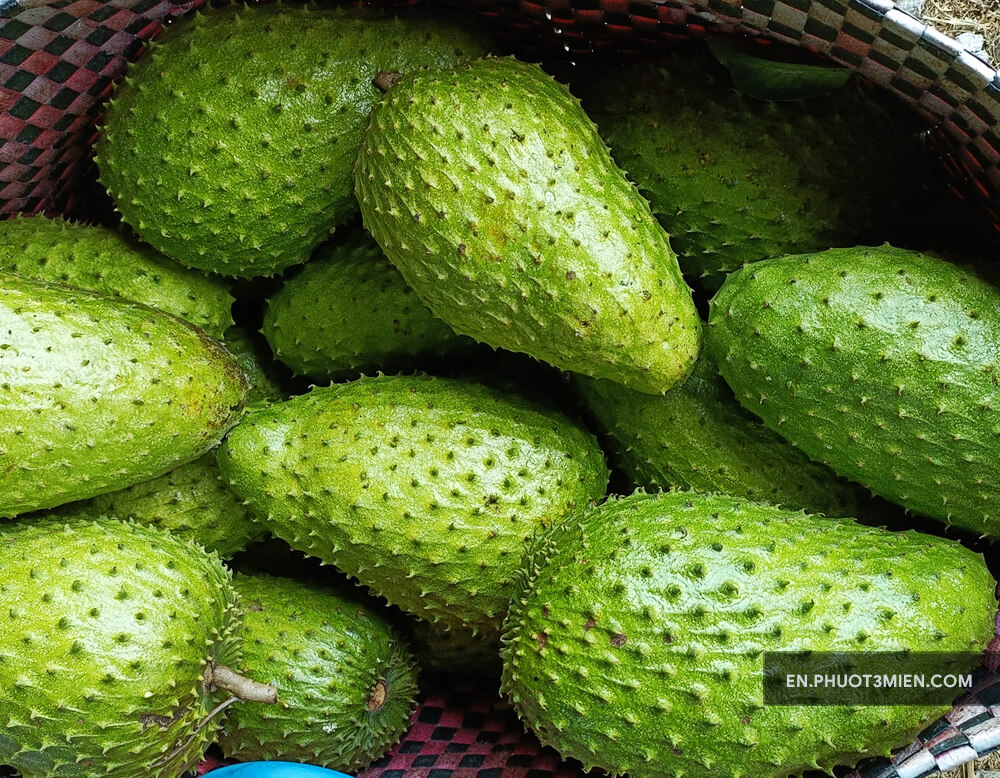
Many studies have revealed that this fruit is good for your health. It helps boost energy. If you always feel tired, this is your “food medicine”. Soursop is also good for your digestion, it has a rich amount of vitamin c, and it will strengthen your bones and teeth. However, do not eat more than 50 grams a day. Eat all delicious things in moderation!
Where to Find Mang cau xiem
In Vietnam, Tien Giang and Hau Giang Province are where you can find this fruit. Since it makes a huge profit, a lot of farmers in these two places are starting to grow it for a living.
Fun Facts
- A soursop can weight up to 6.8 kilograms.
- The seeds of this fruit can be harmful as you might swallow one on accident.
Hopefully while you travel our great country, you will get a chance to try or recognize these fruits. It often depends on the season, but you will notice many in just the space of a marketplace! Comment below if you can’t name something you see, and I’ll help you figure out what it is!
Please check out these links for more information on what to eat:
Long-Standing Food Stalls in Saigon
A Comprehensive Guide to Vietnamese Food in Hanoi
What to Eat in Hue Vietnam: A Foodie’s Guide
Follow Travel Blog for more fun and thorough information about Vietnam!

